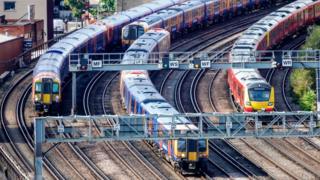 Image copyright
Getty Images
Image copyright
Getty Images
The government has scrapped rail franchising and announced plans to extend support for train firms.
After passenger numbers fell during lockdown, taxpayer money was used to plug the shortfall in ticket revenues.
So far, the bill has run to more than £3.5bn and the Department for Transport has said "significant" support will still be needed.
Although passenger numbers have edged up since lockdown, they are still less than half pre-pandemic levels.
As a result, emergency measures to cover the losses of train firms have been extended by 18 months. They will mean that trains are still able to run, even with fewer passengers.
Throughout that period ministers hope to carry out broader reforms to Britain's railways.
They will consider adopting a concessions-based system in the longer term, whereby train companies are paid a fixed fee to run services.
It marks the end of rail franchises, which have been in place since the 1990s.
In a statement, Transport Secretary, Grant Shapps said: "The model of privatisation adopted 25 years ago has seen significant rises in passenger numbers, but this pandemic has proven that it is no longer working."
He said the move to a new system would end "uncertainty and confusion about whether you are using the right ticket or the right train company".
The government and the train companies are painting this as a good deal. But in reality, because of Covid, it's a fairly unsatisfactory scenario for all those concerned.
The taxpayer will be liable for the losses on the railways for a much longer period of time. And with the virus spreading, passenger levels might remain suppressed - so the losses could continue for some time to come.
Meanwhile, train companies who operated franchises that were losing money before the pandemic, still owe money to the Department for Transport from those contracts. Although, that thorny issue has been kicked down the road and the negotiations over past payments now need to be resolved by December.
Private train companies have no easy option.
The emergency deals keep them in the game but they're a metaphorical straight-jacket, which make them commercially un-enticing.
For now, no train company has "handed back the keys", which would force the government to take on the running of a route. Doing so carries financial penalties and does nothing for a firm's reputation.
Instead, all of them have, in the short-term, opted for the least bad option there is.
And there is still not consensus within government over what the railways will look like after the pandemic so the detail on that is pretty thin.
Train companies have welcomed the plans to replace Britain's often-criticised system of rail franchising.
Paul Plummer, the boss of the Rail Delivery Group, which represents train firms, called for a simpler-to-use fare system.
He said: "These transitional contracts should be a stepping-stone to a better railway."
But rail expert Sir Michael Holden, who used to run South West Trains, said: The big issue is, what is that something else to look like?"
He told the BBC's Today programme that the current emergency measures were "the worst possible arrangement to run the railways".
"We've got the dead hand of the government on the helm... controlling all of the detailed decisions of the railway."
"And yet, they're still paying for public sector operators to run the railway for them."

 5 years ago
860
5 years ago
860 

